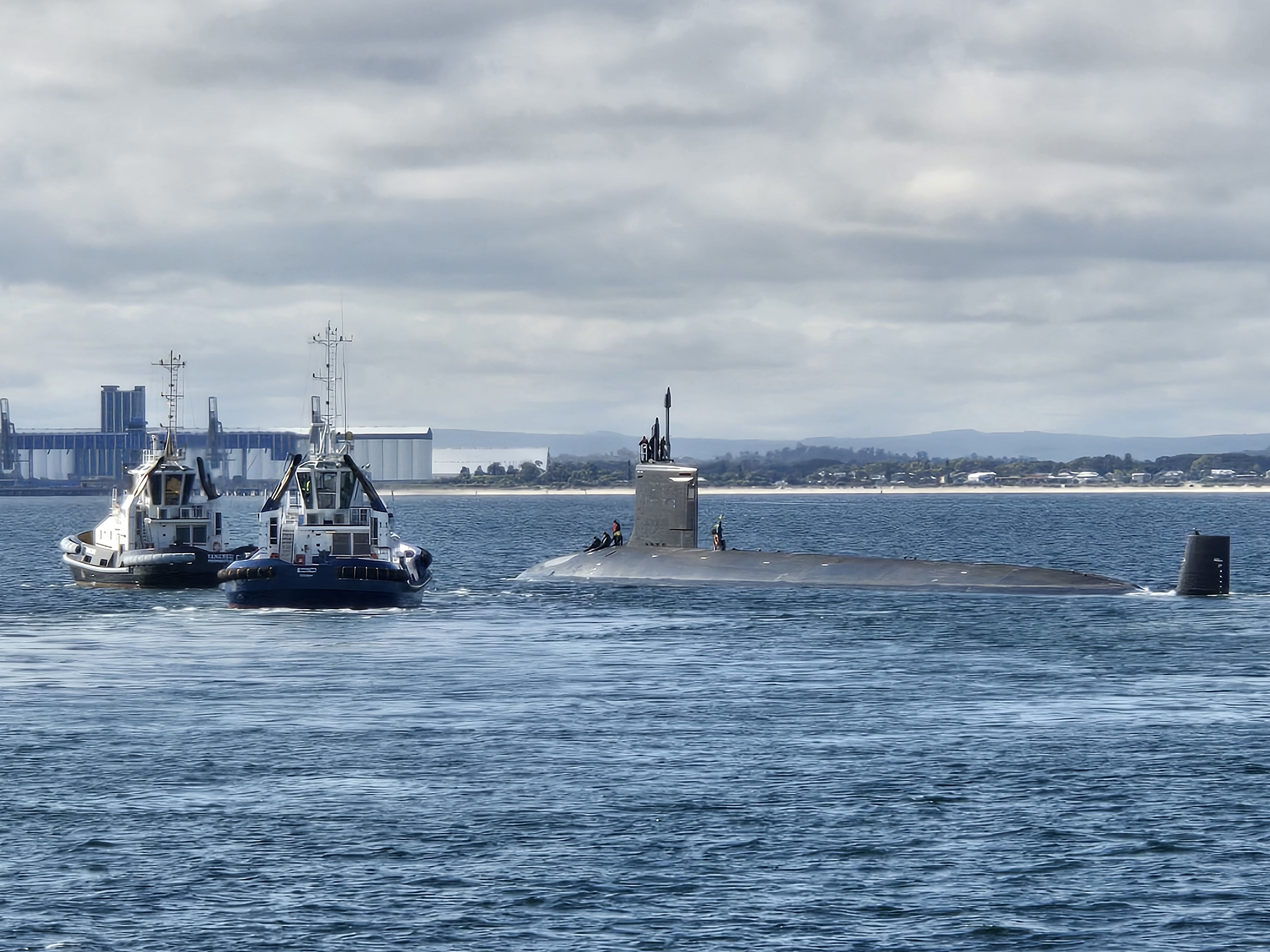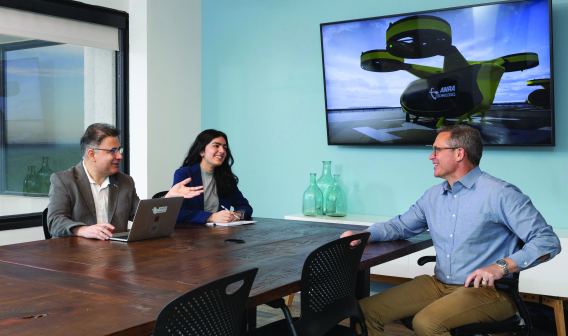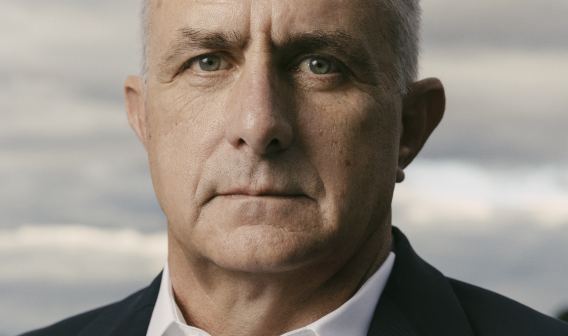A Security Boost in Hampton Roads
The AUKUS partnership is poised to grow demand for Virginia-built subs

The AUKUS security partnership includes an agreement for the Royal Australian Navy to purchase five Virginia-class submarines, like the USS Hawaii, from the United States.
A trilateral security partnership to share technology and military resources is poised to benefit the Hampton Roads economy and Virginia’s defense ecosystem.
The United States, Australia, and the United Kingdom formalized the AUKUS partnership in 2021. This partnership fosters technology exchanges between the countries in building Australia’s nuclear-powered submarine fleet.
The partnership includes an agreement for Australia to purchase up to five nuclear-powered Virginia-class submarines from the United States, along with plans for a common platform to combine and leverage shared submarine technologies. The Commonwealth is a key part of that agreement because of the thriving maritime industry in Hampton Roads and Virginia’s leadership position in the defense and cybersecurity fields. The area is a global gateway that offers unparalleled connectivity through one of the world’s largest natural harbors at the mouth of the Chesapeake Bay.
The city of Newport News is home to Newport News Shipbuilding (NNS), the largest industrial employer in Virginia. NNS is a division of HII, formerly Huntington Ingalls Industries, the largest military shipbuilding company in the United States. NNS is the United States’ sole designer, rebuilder, and refueler of nuclear-powered aircraft carriers for the U.S. Navy, and one of only two shipyards capable of building nuclear-powered submarines. The company is also a founding member of the AUKUS Workforce Alliance, a partnership with three Australian universities dedicated to building a skilled workforce to support the agreement and strengthening Australia’s defense sector by engaging with Australian and British defense companies and potential suppliers.
Michael Lempke, president of HII’s Nuclear and Environmental Services business group and leader of the company’s Australian business efforts, called AUKUS “an unprecedented opportunity for the integration and expansion of industrial capacity” across the three nations. HII has hosted numerous Australian and British officials over the past two years as the three countries determine the optimal pathway to supply Australia with nuclear subs.
A Hub for Maritime and Defense
In addition to HII/NNS, Hampton Roads is home to shipbuilding facilities for major defense contractors, including BAE Systems, General Dynamics NASSCO, and Northrop Grumman Corporation. Northern Virginia is home to a similar cluster of defense companies, drawn by the proximity of the federal government and its research investments. Geopolitical issues in Ukraine and Gaza and ongoing tensions with China have driven military investments that dovetail with Virginia’s priorities around energy security and the supply chain.
Defense spending is driving other facilities in the area. In September, Norwegian defense company Kongsberg Defence & Aerospace announced plans to invest $71 million to establish a new missile production facility in James City County to serve the U.S. Air Force and Navy.
“Those disruptive geopolitical forces have renewed the importance of defense manufacturing, the supply chain, and decarbonizing the economy,” said Jared Chalk, chief business development officer at the Hampton Roads Alliance (HRA). “There’s nowhere else in the country where all those things intersect as well as they do in Hampton Roads.”
Disruptive geopolitical forces have renewed the importance of defense manufacturing, the supply chain, and decarbonizing the economy. There’s nowhere else in the country where all those things intersect as well as they do in Hampton Roads.
Chalk also highlighted the importance of nuclear power in promoting energy security in the United States, pointing out, “We build small nuclear reactors [at NNS] — we’re just putting them on subs and sending them out into the water.”
Hampton Roads has another major advantage for defense companies — the presence of the only two North Atlantic Treaty Organization (NATO) commands in North America, both located in the city of Norfolk. Increased international interest in the region led HRA to set up the IDEA Lab, a coworking space aimed at companies in the defense, energy, aerospace, and aviation fields, in Norfolk’s World Trade Center building.
Workforce Opportunities
One international business operating in that space is Australian maritime company QMS, which set up a training center for U.S. technicians. As part of the AUKUS agreement, QMS will establish a nondestructive testing (NDT) Center of Excellence to recruit, train, and provide experience to build the NDT workforce in the region. At press time, the company was conducting site visits to find a permanent location for the training center. In March 2024, QMS CEO Crystal Kennedy told Virginia Business the company is targeting Newport News for the location. The training will focus on the field of NDT, where stress tests do not permanently alter the item being inspected — a nuclear sub, in this case.
QMS had observed NDT workforce issues in Australia and elsewhere. Attrition to higher-paying fields like oil, gas, and mining is a problem in the industry, as is experience — many NDT technicians graduate with no on-the-job or simulation experience.
“There’s a big problem with attrition and younger workers going into industry that pays a bit more,” Kennedy said. “Turnover for NDT workers is around 30–40% in maritime defense. It’s a continual job to keep maritime workers trained so that we can effectively contribute to the continuous maintenance and the shipbuilding industry. The maritime/defense industry is unlike any other and can be one of the hardest environments to practice your trade. At the end of the day, combining trade and ecosystem into a complete training package saves time, is efficient, and contributes to the mission.”
QMS will also focus on testing and adopting new NDT technologies, notably in the areas of augmented and virtual reality, 3D modeling, and advanced testing methods. The company will use specialized haptic-enabled gloves to enable natural interaction in a virtual maritime environment, along with 3D-printed working replicas of the NDT equipment technicians use in the field. NDT for submarines largely involves testing the strength of welds and a ship’s structure and maintaining this quality throughout the vessel’s lifetime. Because a goal of the center is robust quality testing without compromising the integrity of the ship being tested, technological advances can make a big difference in the process.
“Creating innovative new software and technologies has helped us fulfill that mission better,” Kennedy said. “Instead of throwing humans at it, we can all work together to make sure the workforce we have and the workforce we are creating are more adept with today’s technological advancements and remain on the cutting edge of future technologies already in development.”
The kind of work-based learning Kennedy described is a priority for Virginia as it trains workers for entry-level positions in growing fields, as well as advanced methods. Advanced Technician Workforce training programs were a key factor in propelling Virginia to the top spot in CNBC’s Top States for Business rankings in 2024. The Virginia Talent Accelerator Program, which provides bespoke training and recruitment solutions to qualified new and expanding companies, repeated in the No. 1 spot in Business Facilities’ national Customized Workforce Training rankings.
“It’s a big deal for us to work within the community and have the whole of Hampton Roads involved in what we’re doing,” Kennedy said. “There’s so much out there where we can help the defense and ship industry if we sit down as partners, much more than if we try to do it alone.”




